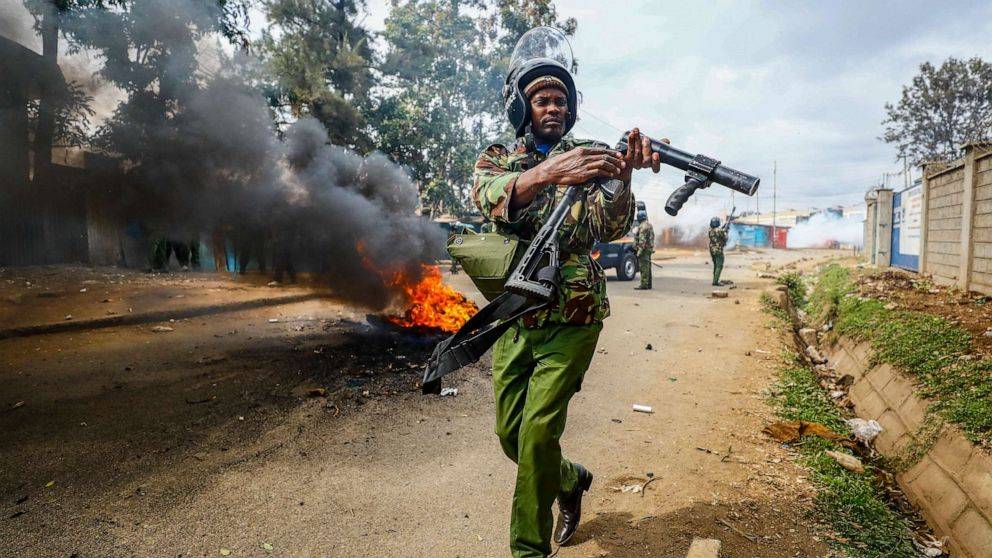LONDON -- Kenya braced for a series of anti-government protests led by the political opposition, voicing their discontent over a contentious new finance bill and the escalating cost of living in the country.
On the first day of the planned three-day protest against higher taxes, the situation turned violent, with six people shot and killed and a dozen others injured, according to Mathias Kinyoda of Amnesty International Kenya. The unrest also led to the arrest of at least 87 demonstrators across the nation.
The protests were called by the opposition leader, Raila Odinga, despite Kenya's President William Ruto's vowing to prevent any protests in the East African Nation.
In a statement sent to ABC News, Odinga's party, Azimio La Umoja, reaffirmed their commitment to the peaceful protests scheduled for Wednesday, Thursday, and Friday, as earlier announced by their leadership.
Clashes between protesters and police resulted in five injuries on the first day. Amnesty International Kenya reported the presence of paramilitary police officers and armoured water cannon trucks patrolling and confronting demonstrators in various towns and neighbourhoods.
Kibera, known as a stronghold of the opposition, witnessed particularly intense protests, with demonstrators setting fire to tyres and furniture, pelting stones, and the police responding with tear gas. The United Nations reported that at least 23 people were killed in the recent round of anti-government protests, and over 300 individuals were arrested.
Similar protests have been reported in other Kenyan counties, including Kisumu, Kisii, and Migori.
As a precautionary measure following "credible security intelligence," Kenya's Ministry of Education ordered the closure of all primary and secondary schools in Nairobi and the coastal city of Mombasa on the protest days. Numerous businesses also decided to remain closed during this period.
The root cause of the protests lies in the contentious finance bill, which Kenya's President Ruto signed into law at Nairobi's State House the previous month. The bill proposed doubling the tax on fuel from 8% to 16% and aimed to help alleviate the country's external debt. However, it would have a ripple effect on the prices of essential commodities, further exacerbating the economic strain faced by Kenyan citizens, who were already grappling with the rising cost of living.
The implementation of the finance bill, initially set for July 1, was halted by Kenya's High Court following a case brought forward by opposition Senator Okiya Omatah, who argued that the bill was unconstitutional.
In response to the escalating situation, the U.S. Embassy in Nairobi, along with Heads of Mission from 13 other countries, expressed sadness over the loss of life during the anti-government protests and voiced concerns about the levels of violence witnessed in recent demonstrations.
Speaking at a press briefing in Geneva, U.N. Human Rights Office Spokesperson Jeremy Laurence appealed for calm and called on the authorities to uphold the right to peaceful assembly, as guaranteed by the Kenyan Constitution and international human rights law.
The situation in Kenya remains tense as the protests continue to unfold. The government's response and willingness to engage in dialogue with the opposition will play a crucial role in determining the path the nation takes in addressing the concerns of its citizens and finding a sustainable solution to the economic challenges at hand.
The continuing protests in Kenya have put the government under immense pressure to address the grievances of its citizens. As tensions remain high, both the opposition and the government must recognise the urgency of finding common ground through dialogue and negotiation.
Opposition leader Raila Odinga's decision to call for nationwide protests highlights the deep-rooted dissatisfaction among many Kenyans over the government's handling of the finance bill and the economic hardships they are facing. The rising cost of living has pushed many families to the brink, making it difficult for them to make ends meet.
President William Ruto's firm stance against allowing protests in the country demonstrates the government's concern about the potential for violence and instability. However, a balanced approach is essential. Suppressing dissent and peaceful protests can exacerbate the situation, leading to more significant challenges in the long run.
The international community, including the United States and other countries with diplomatic missions in Kenya, has expressed its concern over the escalating violence and loss of life during the protests. Their call for peaceful resolution and dialogue should serve as a reminder to all parties involved that resorting to violence will only further harm the nation's stability and development.
The closure of schools and businesses during the protests underscores the disruptive impact of civil unrest on the daily lives of Kenyan citizens. It is crucial for all stakeholders to understand the gravity of the situation and engage in constructive discussions to find a way forward.
At the heart of the matter lies the contentious finance bill, which aimed to tackle Kenya's external debt but inadvertently added to the financial burden of an already struggling population. The government's intention to address the country's economic challenges is commendable, but it must also consider the potential adverse effects on vulnerable segments of society.
To de-escalate tensions and pave the way for constructive dialogue, both the government and the opposition need to demonstrate a willingness to listen to each other's concerns and prioritise the well-being of the people they serve. Engaging in meaningful talks can lead to finding alternative solutions that strike a balance between fiscal responsibility and safeguarding the livelihoods of ordinary Kenyans.
The international community can play a supportive role by offering to mediate and facilitate peaceful negotiations between the government and the opposition. International organisations like the United Nations can also provide expertise and advice on sustainable economic measures and debt management.
Moreover, transparency and accountability are essential for restoring trust between the government and the people. Ensuring that the decision-making process is open and accessible to public scrutiny will help foster a sense of ownership among citizens and allow them to participate actively in shaping the country's economic policies.
While the immediate focus is on resolving the current crisis, it is equally important to address the long-standing systemic issues that have contributed to the prevailing discontent. This includes tackling corruption, improving governance, and promoting inclusive economic growth that benefits all Kenyans, regardless of their social or economic status.
In the pursuit of a peaceful resolution, it is crucial to protect the fundamental rights of citizens, including the right to peaceful assembly and expression. The government must exercise restraint in its response to protests, ensuring that law enforcement operates within the bounds of international human rights standards.
As the protests continue, civil society organisations, religious leaders, and other stakeholders can play a vital role in promoting non-violence and providing platforms for constructive dialogue. By encouraging peaceful means of expressing grievances, they can help prevent the situation from spiralling into further violence and unrest.
In conclusion, the ongoing protests in Kenya underscore the urgency of addressing the pressing economic challenges faced by the nation. While the government has a responsibility to manage external debt and ensure fiscal stability, it must also prioritise the well-being of its citizens.
Dialogue and peaceful resolution are the most effective ways to chart a path forward and build a more prosperous and equitable Kenya. The international community's support, combined with genuine efforts from all sides, can lead to sustainable solutions and a brighter future for the people of Kenya.




No comments yet
Be the first to share your thoughts!